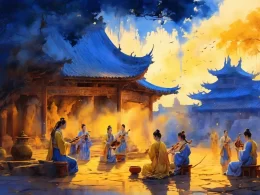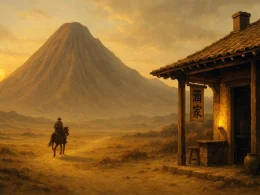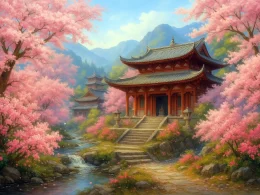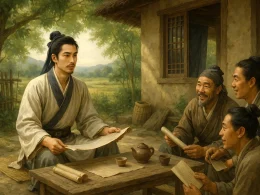What shall I say of the Great Peak? --
The ancient dukedoms are everywhere green,
Inspired and stirred by the breath of creation,
With the Twin Forces balancing day and night.
...I bare my breast toward opening clouds,
I strain my sight after birds flying home.
When shall I reach the top and hold
All mountains in a single glance?
Original Poem
「望岳」
杜甫
岱宗夫如何?齐鲁青未了。
造化钟神秀,阴阳割昏晓。
荡胸生层云,决眦入归鸟。
会当凌绝顶,一览众山小。
Interpretation
This poem was composed in 735 AD (the 23rd year of the Kaiyuan era of Emperor Xuanzong of the Tang Dynasty), when Du Fu traveled to Luoyang to take the imperial examination for the jinshi degree. After failing the exam, he wandered for about five years in the regions of Zhao and Qi (present-day Henan, Hebei, and Shandong). Gazing at Mount Tai was written during Du Fu's visit to Mount Tai. This poem is the earliest surviving work by Du Fu, showcasing the vigor and lofty aspirations of his youth.
First Couplet: "岱宗夫如何?齐鲁青未了。"
Dài zōng fū rú hé? Qí Lǔ qīng wèi liǎo.
What is Mount Tai, the foremost of the Five Sacred Mountains, truly like? Across the lands of Qi and Lu, its verdant peaks stretch endlessly.
This couplet opens with a rhetorical question, filled with awe and admiration, capturing the poet's sense of wonder and delight upon first seeing Mount Tai. The mention of "Qi and Lu" emphasizes the mountain's vastness, while "verdant peaks stretch endlessly" vividly depicts its lush, rolling grandeur.
Second Couplet: "造化钟神秀,阴阳割昏晓。"
Zào huà zhōng shén xiù, yīn yáng gē hūn xiǎo.
Nature has gathered all its divine beauty here; the towering mountain divides light and darkness, dawn and dusk.
This couplet further describes the mystical and majestic qualities of Mount Tai. "Nature has gathered all its divine beauty" highlights the mountain's unique charm, while "divides light and darkness" underscores its towering height and dramatic contrast between its sunlit and shaded sides, enhancing its majestic presence.
Third Couplet: "荡胸生层云,决眦入归鸟。"
Dàng xiōng shēng céng yún, jué zì rù guī niǎo.
Layers of clouds rise, stirring my heart; straining my eyes, I watch the returning birds vanish into the forest.
This couplet shifts from the mountain's overall image to specific details, using dynamic scenes to evoke the poet's emotions. "Layers of clouds rise" conveys the awe inspired by the swirling clouds, while "straining my eyes" emphasizes the poet's focus and immersion in observing Mount Tai.
Fourth Couplet: "会当凌绝顶,一览众山小。"
Huì dāng líng jué dǐng, yī lǎn zhòng shān xiǎo.
I will surely climb to the summit and gaze down upon all the mountains below.
This couplet is filled with grandeur and momentum, expressing the poet's fearless determination to conquer the peak. The phrase "I will surely" conveys unwavering resolve, while "gaze down upon all the mountains below" reveals the heroic spirit of looking down from the summit, embodying the poet's lofty ambitions and disdain for obstacles.
Overall Appreciation
The poem progresses from distant views to close observations and finally to the act of climbing, capturing the splendor, majesty, and unique beauty of Mount Tai. It reflects the poet's youthful vigor and heroic spirit. The poem not only marvels at the natural beauty but also conveys the poet's pursuit of ideals and fearless determination. The final lines, "I will surely climb to the summit and gaze down upon all the mountains below," elevate the poem to its climax, showcasing the poet's proactive and heroic attitude toward life.
Writing Characteristics
- Clear Structure, Scene and Emotion Intertwined: The poem progresses from distant views to close observations and finally to climbing, with a tightly structured and step-by-step deepening approach.
- Grand Imagery, Majestic Momentum: Through images like "verdant peaks stretch endlessly," "divides light and darkness," and "straining my eyes," the poet captures the grandeur of Mount Tai, painting a magnificent landscape.
- Emotionally Rich, Profound Meaning: The poet uses the act of climbing Mount Tai to express his life aspirations, showcasing his proactive and courageous spirit.
Insights
This poem not only portrays the majestic splendor of Mount Tai but also reflects the poet's firm belief in overcoming difficulties and striving for life's peaks. It reminds us that no matter how many obstacles we face on life's journey, as long as we hold onto our aspirations and move forward courageously, we will eventually reach our own "summit" and look down upon the vast expanse of life.
Poem translator
Kiang Kanghu
About the poet
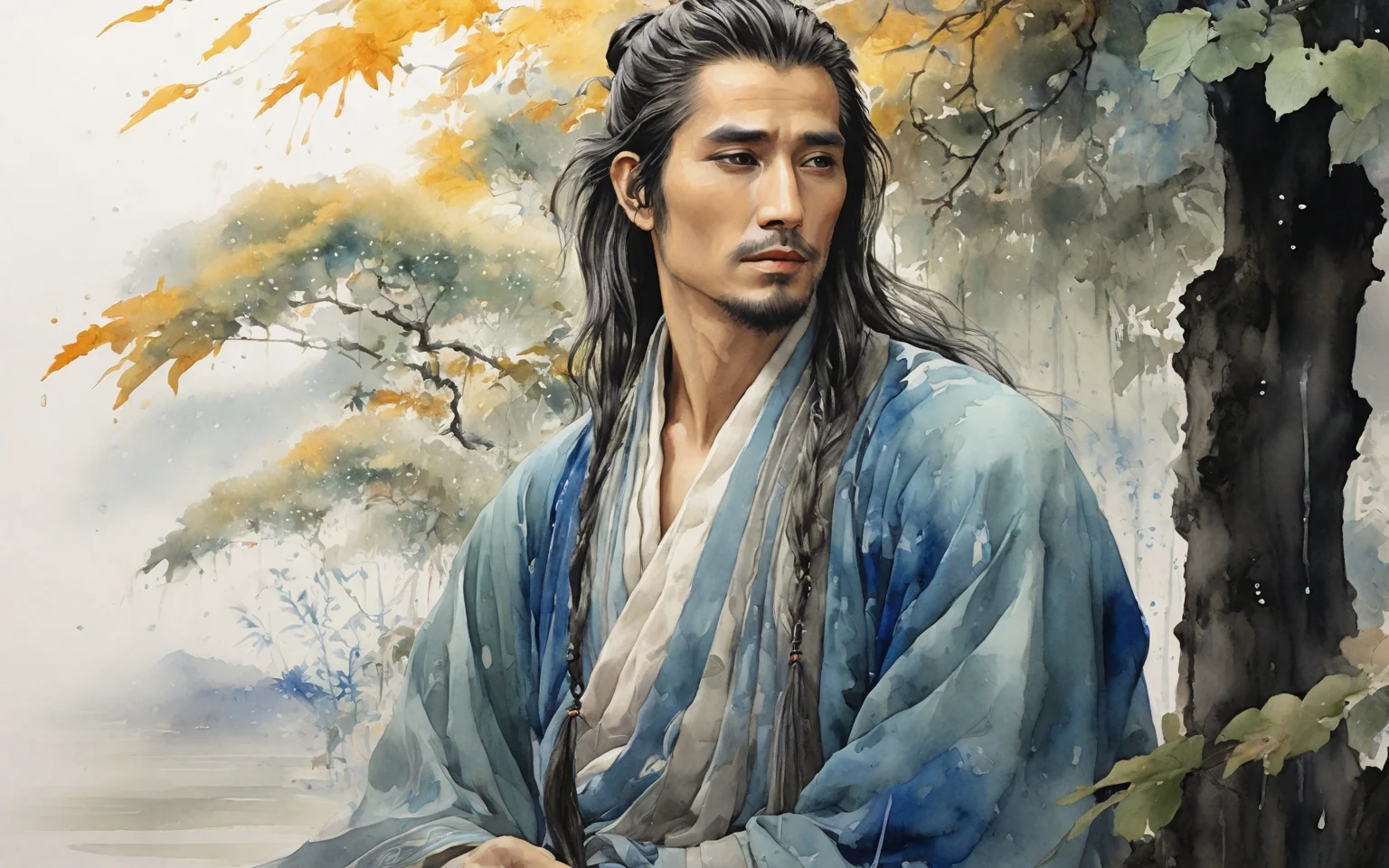
Du Fu (杜甫), 712 - 770 AD, was a great poet of the Tang Dynasty, known as the "Sage of Poetry". Born into a declining bureaucratic family, Du Fu had a rough life, and his turbulent and dislocated life made him keenly aware of the plight of the masses. Therefore, his poems were always closely related to the current affairs, reflecting the social life of that era in a more comprehensive way, with profound thoughts and a broad realm. In his poetic art, he was able to combine many styles, forming a unique style of "profound and thick", and becoming a great realist poet in the history of China.









